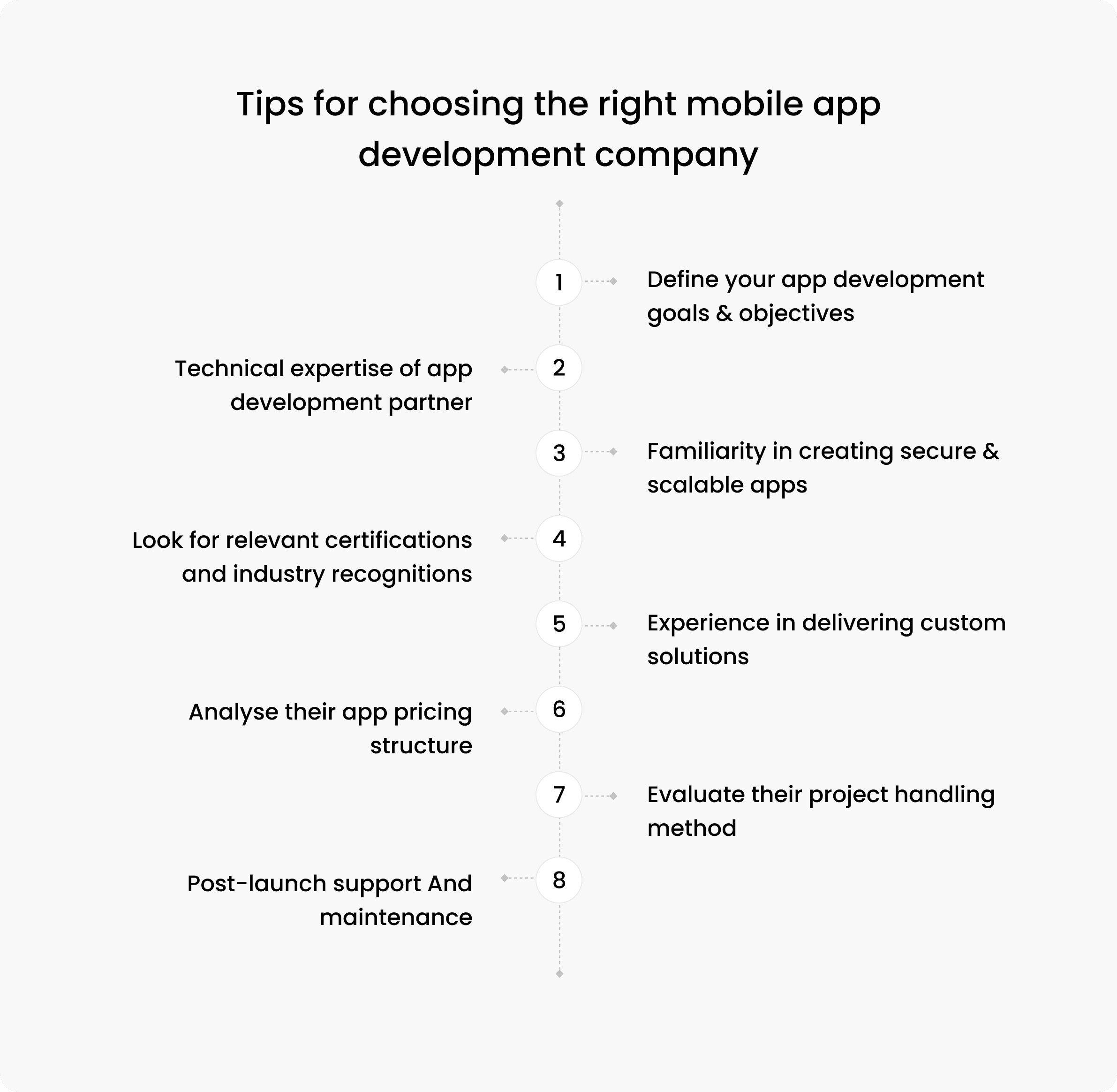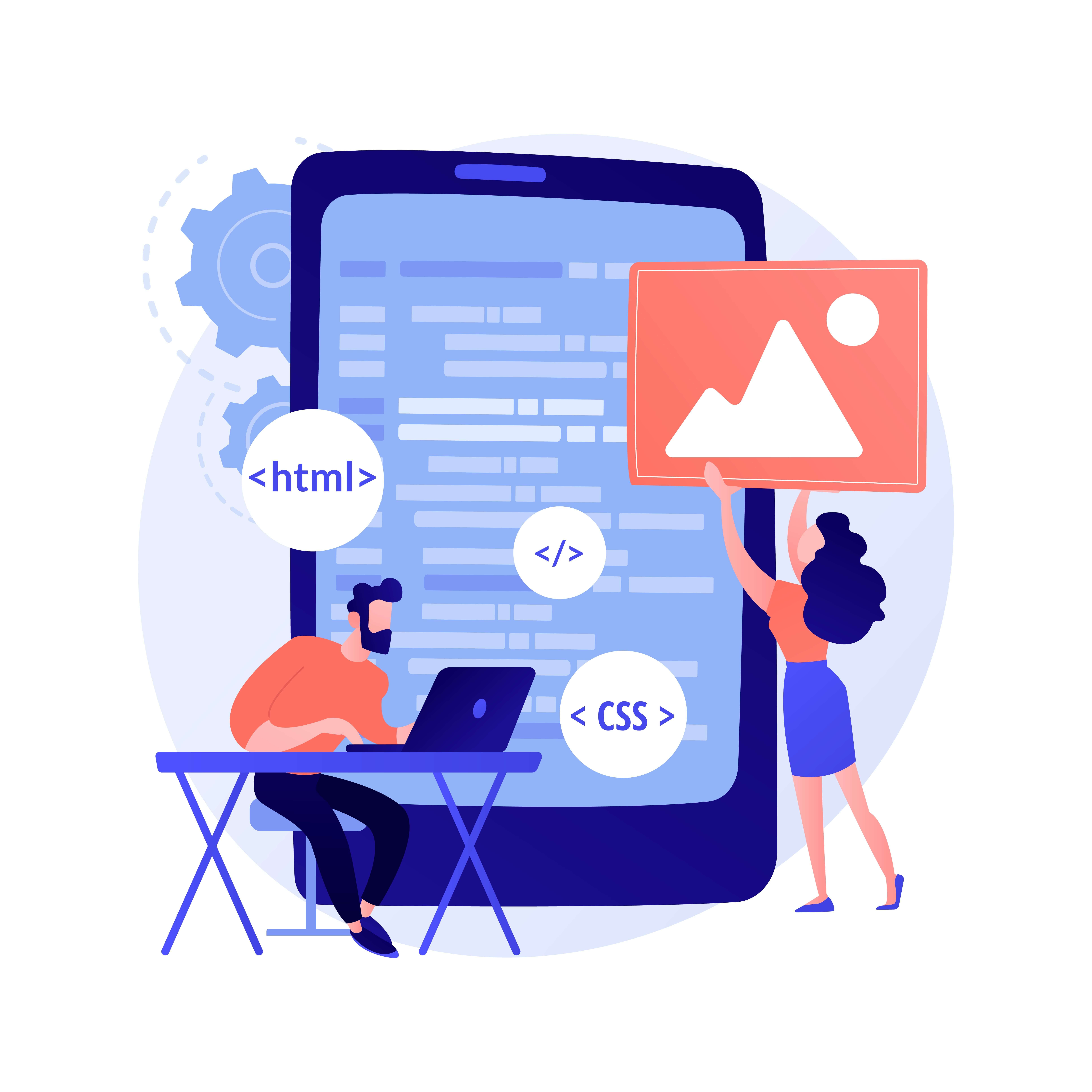How to Choose a Mobile App Development Company That Delivers on Time and Budget
Nidhin N P
August 5, 2024
5 Min read

The app development industry has witnessed exponential growth globally and continues to evolve at an unprecedented pace. In 2023, the global mobile app development market was valued at USD 240.4 billion, and projections indicate it will soar to approximately USD 666.1 billion by 2032, growing at a robust CAGR of 12.1% from 2024 to 2032. This journey began with a valuation of USD 10.27 billion in 2018, which will rise to an anticipated USD 407.31 billion by 2026, according to Straits Research.
With such remarkable growth and rapid advancements, the question arises: how to choose a mobile app development company that can develop a mobile application not only survive but prosper in the dynamic digital ecosystem? Before answering this question you must answer the core Building a successful mobile application goes far beyond technical expertise; it demands a visionary and dependable development partner who can transform your concept into a successful application. Your app must not only meet but exceed user expectations to carve a niche in this fiercely competitive market.
Choosing the best mobile app development company is one of the most strategic decisions your business will face. The ideal partner simplifies the complexities of app design, functionality, scalability, and security while ensuring an efficient user experience. With millions of apps flooding the market, a mediocre app won't suffice. It must deliver an exceptional user experience, integrate the most advanced features, and prioritise robust security to stand out.
In short, considering the right mobile app development partner could turn your vision into a reality but how?
How Can An Essential Checklist Be Your Handy Partner?
A comprehensive checklist can guarantee you all the help you need to make the best decision more easily. From defining your project's goals and assessing technical expertise to ensuring scalability, security, and post-launch support, every detail counts. However, this raises the question of what should be on your checklist. The crucial criteria must be included to help you sort through your project's challenges and needs simultaneously. This checklist can be your trump card on how to choose a mobile app development company. One must be aware of the inclusions to make your checklist the most effective and efficient one to comprehend it with ease.

Start Strong: Define Your Objectives for Your App Development Project
Knowing your objectives and needs is essential before you start looking for a mobile app development partner. In addition to being crucial for internal planning, a clearly defined app development project scope enables your possible partners to offer precise estimates and schedules. Here are the steps to get started:
-
Core Purpose: What is the core goal of your app? Does it aim to raise brand awareness, provide a new service, automate processes, or boost client engagement? You can effectively convey your idea to possible developers and make sure they meet your expectations by outlining the primary goal.
-
Target Audience: To create an app that appeals to your target audience, you must first identify who they are. A sleek, social media-like layout might be preferred by Gen Z users, but business users might value an app that is easy to use, safe, and functional. Take user preferences, industry, location, and age into account.
-
User Stories and Functional Requirements: Create a series of user stories outlining the ways in which users will engage with the application. For example, users should be able to view their purchase history so that they can track their past orders. This guarantees that the development partner is aware of the required functions and aids in the communication of the features that are required.
-
Technical Specifications: You might require particular technical features, like payment gateways, APIs, integration with third-party services, or sophisticated features like artificial intelligence, depending on how complex your app is. Be careful to include all of these requirements upfront.
-
Budget and Timeline: Clearly state your financial and schedule limitations. You may assess possible partners and prevent misplaced expectations by having a thorough awareness of the resources that are accessible. When it comes to time and money, be realistic about your objectives.
What Essential Technical Expertise and Skills Should You Look For?

Evaluating a development partner's technical proficiency is essential when selecting one to make sure they possess the knowledge and abilities needed to manage your project. Key areas of attention consist of:
-
Platform Expertise (iOS, Android, or Cross-Platform): When choosing an app development partner, evaluating their platform expertise is critical. One of the key aspects to consider is their ability to guide you in deciding between native or cross-platform. With Android and iOS collectively accounting for 99.24% of the global market share a partner’s proficiency in these platforms can significantly influence your app’s success. Native apps designed exclusively for either iOS or Android, deliver exceptional performance and smooth user experiences. However, this approach requires a higher investment of time and resources, as development and maintenance are platform-specific. A reliable development partner should not only demonstrate technical expertise in building native apps but also help you weigh these benefits against potential costs. Alternatively, cross-platform frameworks like Flutter and React Native allow for a more efficient development process. With a single codebase for both platforms, these frameworks save time and money while still offering commendable performance. An experienced development partner should possess in-depth knowledge of such technologies and guide you on whether a cross-platform solution aligns with your goals. The ideal partner will assess your target audience, budget constraints, and project requirements, leveraging their expertise to recommend the best development strategy.
-
Proficiency in Development Frameworks: While cross-platform programming uses frameworks like React Native, Flutter, and Xamarin, native development uses languages like Swift (for iOS) and Kotlin (for Android). Based on the needs and complexity of your app, pick a partner who is skilled in the appropriate frameworks.
-
Understanding of Emerging Technologies: The mobile app market is changing quickly as a result of new technologies like blockchain, augmented reality, virtual reality, and artificial intelligence. If your app requires sophisticated functionality, find out about their experience incorporating these technologies into mobile solutions.
-
Lifecycle Management: Effective mobile app development adheres to the Agile methodology's tenets, guaranteeing continuous testing, improvement, and refinement in response to user input. Find out whether Agile practices are used by your possible partner and how they guarantee quality throughout the development process.
-
Code Quality and Testing Practices: To make sure your app functions properly and satisfies performance requirements, code quality and testing are essential. Enquire about prospective partners' methods for both automated and manual testing, as well as how they guarantee clear, maintainable code. Rather than being an afterthought, quality assurance ought to be a component of the development process.
Build a Foundation for Long-Term Reliability With Security and Scalability
Scalability and security are critical components of every successful app. Your app's security and ability to expand with your company will be guaranteed by a partner who recognizes the significance of these two elements.
-
Advanced Security Practices: Any app that deals with sensitive data should prioritize data protection. Ask them about their knowledge of safe coding techniques, two-factor authentication (2FA), and data encryption. This will guarantee that your app is safe from outside threats.
-
Compliance with Industry Regulations: If your app operates in a regulated industry, such as healthcare or finance, you must adhere to regulations such as HIPAA (Health Insurance Portability and Accountability Act) for healthcare apps and PCI DSS (Payment Card Industry Data Security Standard) for fintech applications. A credible partner will guarantee that your app conforms with the applicable rules.
-
Scalability: Scalability guarantees that your application can accommodate growth, be it a rise in data or users. Your app can adjust to increased loads with a scalable app architecture, guaranteeing smooth operation as your user base expands. Enquire about their background in developing scalable applications with contemporary cloud computing platforms such as Microsoft Azure, Google Cloud, or AWS.
Certifications And Industry Recognitions— The Indicators Of Quality And Credibility
Industry recognition and certifications are important markers of a development partner's legitimacy and dedication to excellence. Among the important credentials and certificates to search for are:
-
ISO/IEC Certifications: ISO certifications, like ISO 9001, are globally accepted and show that a business follows strict quality control procedures. The partner's dedication to providing top-notch services is guaranteed by these credentials.
-
Developer Program Memberships: Developers must be enrolled in both the Google Play Developer Program and the Apple Developer Program to work on iOS or Android apps. They have access to the newest tools for creating top-notch apps and adhere to the platform's best practices when they are a part of these programs.
-
Third-Party Verifications: Independent customer reviews and ratings are available on websites such as Clutch, GoodFirms, and AppFutura. You can learn more about a partner's professionalism, job quality, and capacity to fulfill commitments and deadlines by reading these validated reviews.
Tailoring Custom Solutions For Diverse Client Needs And Industries
According to ResearchGate, it is very evident that digital media consumption heavily relies upon and revolves around mobile phones, with apps accounting for a staggering 90% of the time spent on a mobile phone apart from using it for calls and SMS. The Emerging Technologies for Sustainable and Smart Energy publication, also commented that it is not surprising to note that the mobile app industry continues to thrive with around 3.2 billion smartphone users worldwide. The steady rise in smartphone penetration and app usage shows no signs of slowing down, signaling immense opportunities for businesses across industries.
When it comes to developing mobile apps, the demands and challenges vary significantly across sectors. A competent development partner understands these nuances, including industry-specific regulations, consumer expectations, and technological barriers. By utilizing expertise in platforms like iOS, Android, or cross-platform solutions, they can deliver tailored apps that align perfectly with your business goals and address the unique requirements of your sector.
-
Startups: When it comes to developing mobile apps, different sectors have different needs. A competent partner will be aware of the unique obstacles and rules in your sector and provide tailored solutions that meet your company's requirements.
-
Enterprises: Enterprise clients typically require robust security features, scalability, and compliance with industry regulations. A good partner will have experience working on large-scale applications and ensuring smooth integration with existing systems.
-
Industry-Specific Solutions: Certain compliance obligations apply to sectors like healthcare, finance, and education. Apps used in healthcare must adhere to HIPAA regulations to safeguard patient data. Secure transactions, data privacy, and encryption are critical security elements in fintech.
Budget and Pricing Models: Selecting the Right Financial Structure
Choosing the right pricing model can greatly affect the success of your project. Here are some common pricing models:
-
Fixed-Price Model: When the project scope is well-defined and there are no expected changes, this paradigm works best. You successfully manage costs and budget by agreeing on a set cost for the duration of the project.
-
Time-and-Materials Model: This methodology is more adaptable and appropriate for projects with changing scope or ambiguous needs. The time invested by the developers and the resources needed for the project determines the final cost.
-
Transparent Pricing: Regardless of the arrangement, make sure the partner provides complete cost transparency, including any additional fees for maintenance, updates, or third-party integrations.
Ensuring Effective Communication and Project Management

Effective communication and strong project management are essential for ensuring that the development process goes smoothly and meets deadlines.
-
Dedicated Project Manager: Regardless of the arrangement, make sure the partner provides complete cost transparency, including any additional fees for maintenance, updates, or third-party integrations.
-
Use of Project Management Tools: Jira, Trello, and Asana are examples of contemporary project management systems that facilitate job management, progress tracking, and on-time delivery. Find out what tools your prospective partner uses and how they handle project deadlines.
The Importance Of Post-Launch Support And Maintenance
An essential step in the app development process is post-launch support. The initial launch is only the first step; frequent upgrades, problem repairs, and ongoing enhancements are necessary for long-term success.
-
Bug Fixes And Updates: Make sure your partner provides frequent upgrades, security patches, and bug fixes as well as other ongoing maintenance services.
-
Performance Monitoring: After the launch, efficient monitoring aids in locating customer feedback or performance problems that may be fixed in upcoming releases.
-
Scalability During Peak Periods: Your app should be scalable after launch to handle seasonal spikes or increasing user traffic. Make sure your partner can scale the app during these periods without causing any performance issues.
Why Custom Solutions Matter: Standing Out with Tailored Mobile App Development
Businesses are increasingly looking for mobile app development partners who can offer specialized solutions catered to their particular requirements in a competitive environment. One-size-fits-all, off-the-shelf apps frequently fail to provide the precise features and user interfaces that companies need.
The following explains why companies that focus on developing unique mobile app solutions dominate the market:
-
Personalized User Experience: A customized user interface and user experience (UI/UX) that embodies your brand's personality and precisely meets the needs of your target audience is made possible by custom apps. A custom solution guarantees that your app feels like yours, strengthening your emotional bond with users through distinctive design elements, customized features, or smooth integration with other systems.
-
Adaptation to Business Requirements: Every business faces unique difficulties, operations, and processes. Whether you want to improve consumer engagement, automate chores, or improve internal operations, a custom app can be created to address your unique challenges. A development partner who collaborates closely with you can create solutions that support your company's objectives, boosting productivity and spurring expansion.
-
Scalability and Flexibility: Your future needs are taken into consideration while creating a unique solution. A custom app can be expanded and adjusted to support new features, capabilities, or integrations as your company grows. Long-term sustainability and adaption as your firm expands are ensured by custom solutions, which provide greater flexibility in handling shifting business dynamics.
-
Competitive Edge: Your company can differentiate itself from rivals who use off-the-shelf, generic solutions by developing a custom mobile application. Introducing innovative features that differentiate your business and appeal to your target audience is made possible by custom apps. Custom solutions provide the freedom to build something genuinely unique, whether it's a highly specialized feature set or a creative application of modern technology.
-
Improved Security and Compliance: Custom mobile apps are made with your unique security requirements in mind, making sure they adhere to rules and industry norms. For instance, finance apps must follow PCI-DSS guidelines, while healthcare apps could need to have security measures that comply with HIPAA. Your app will be designed securely from the bottom up, preserving sensitive data and upholding compliance if it is customized to match these needs.
-
Efficient Integration with Existing Systems: Your current infrastructure, including internal databases, legacy systems, and third-party services, can be easily linked with custom mobile apps. This lowers errors and streamlines procedures by ensuring improved synchronization and smoother data transmission between different business systems. Custom apps don't necessitate complex workarounds or sacrifice the integration of necessary systems, in contrast to off-the-shelf options.
-
Enhanced Support and Maintenance: Because the app is made especially for your company, regular support and maintenance are more effective with a custom mobile app. Your app's design and operation will be known to the development partner who made it, which will make it simpler to fix problems, add new features, and give regular updates as needed.
Pixbit Solutions excels—crafting custom apps that not only align with your business objectives but also become the cornerstone of your brand identity. Let us consider the success story of one of our clients, Channel HES Inc., to illustrate the impact of developing bespoke solutions.
Channel HES Inc., a US-based Home Entertainment Solution, revolutionized the industry by introducing the world’s first Media Gallery Platform (MGP). They envisioned a comprehensive, digital solution, encompassing mobile apps for Android and iOS, as well as a Smart TV application. The objective was to develop an inclusive platform that would serve both film industry professionals and independent content creators, offering them an intuitive way to host and share their work globally. The apps needed to ensure ample space and access to diverse content to meet user expectations.
This case underscores the importance of custom solutions development. A solution that’s tailored to your business not only enhances user experience but can also set your brand apart in the crowded market. The best mobile app development company, led by the best app developers believes that every business deserves an app that reflects its unique goals and vision, helping it succeed in the digital market.
The Future of AI in App Development: Revolutionizing User Experiences and Streamlining Processes

In 2020, the global mobile AI market was valued at an impressive $8.56 billion. Fast forward to 2030, projections reveal a whooping leap to $84.80 billion, underscoring an extraordinary compound annual growth rate (CAGR) of 24.44% between 2021 and 2030. This exponential growth highlights the profound impact artificial intelligence (AI) is poised to have on how mobile applications shape the future of technology and user interaction.
Consider this: an average user spends 88% of their mobile phone time engaging with apps. By integrating AI into these apps, developers can address many pressing challenges while generating innovative solutions. No longer confined to the domain of futuristic speculation, AI is actively transforming how mobile apps are designed, operated, and enhanced. As its role expands, AI promises to deliver smarter, more intuitive, and highly personalized user experiences while simultaneously easing development processes.
The numbers don’t lie. Gartner estimates that 80% of mobile apps today utilize AI technology to enhance customer experiences and to provide superior services. Complementing this is the Clutch survey, which found that 61% of businesses believe adopting AI-driven app development trends has helped them source competitive advantages. Industry insights from Accenture further reveal that integrating AI into mobile apps for iOS and Android can potentially boost revenues by as much as 300%, demonstrating its transformative potential in the mobile app ecosystem.
Moreover, 47% of the most innovative enterprises have already incorporated AI into their mobile apps as part of their marketing strategies. This trend not only underscores AI’s growing importance but also emphasizes its potential to redefine how businesses engage with their audiences.
As we look ahead it becomes increasingly clear that AI will play a central role in reshaping app development. From transforming user experiences to enhancing operational efficiency, the integration of AI into mobile apps opens a world of possibilities. The following are important things to think about regarding AI's role in app development going forward:
-
Enhanced User Experiences with Personalization: The capacity to offer individualized experiences is among the most important effects of AI in mobile apps. AI is able to generate highly customized information, recommendations, and alerts by analyzing user behavior, preferences, and interactions. This eventually results in improved retention rates and more involved users. Apps, for instance, might adjust to the behaviors of certain users by offering customized services, recommendations, or interfaces that change based on the user's requirements.
-
Smarter Automation of Routine Tasks: AI has the potential to revolutionize automation in the creation of mobile applications. In addition to streamlining operations, artificial intelligence (AI) will increase app utilization efficiency by automating repetitive processes like data entry, content classification, and user interaction. AI-powered virtual agents, voice assistants, and chatbots will process consumer inquiries and problems more quickly, increasing user happiness and lowering the need for human interaction.
-
AI for Predictive Analytics and Insights: The adoption of AI-powered predictive analytics will transform the way app developers examine user data. Apps can generate insights based on user behavior, forecast user activities, and suggest goods or services by utilizing machine learning algorithms. This will also optimize the app's functionality to better serve users, anticipate their needs, and improve decision-making, in addition to increasing the accuracy of marketing efforts.
-
Improved App Security: AI will be essential in improving app security as cyber-attacks become more complex. Proactive security measures are made possible by AI's ability to identify odd patterns, behaviors, or abnormalities in real-time. AI will play a critical role in protecting sensitive user data, especially in sectors like financial, healthcare, and e-commerce, whether it be through blocking fraudulent activity, detecting malware, or preventing unauthorized access.
-
AI-Driven Code Generation and Development: AI will be utilized in app development in the future to expedite the real development process. By automating code production, finding errors, and making optimization suggestions, AI can help developers. Platforms powered by AI can give developers immediate feedback on the quality of their code and assist them in increasing the development lifecycle's overall efficiency. Faster app development cycles, more precise code, and lower development expenses will all be made possible by this.
-
Natural Language Processing (NLP) for Efficient Communication: One important aspect of AI that is revolutionizing how people engage with mobile apps is natural language processing (NLP). Users may now interact with their apps using natural language thanks to AI-powered voice assistants like Siri, Alexa, and Google Assistant, facilitating more natural communication. NLP will be integrated even more widely in the future, allowing apps to comprehend sentiment, context, and even complicated user inquiries, improving the user experience overall.
-
AI-Powered App Testing and Quality Assurance: By automating the app testing process, AI will increase the precision and effectiveness of finding problems, defects, and performance snags. Before the app is released, AI can test it on a range of devices, operating systems, and user contexts, mimicking real-world circumstances to find any potential issues. This guarantees that the software works as best it can for a variety of users and cuts down on the time and expense involved in manual testing.
-
Autonomous Apps with Machine Learning: Apps that use machine learning algorithms will be able to function independently without continual human supervision. AI, for example, can enable apps to learn from user input and modify their UI or functionality in real-time. For instance, a shopping app may automatically change its recommendations as new trends appear, or a fitness app may modify its training recommendations based on the user's progress.
-
Real-time Translation and Localization: With real-time translation, AI is making great progress in removing linguistic barriers. Without the need for human translations, apps will be able to translate speech, text, and even photos in real time, enabling companies to reach a worldwide clientele. As a result, apps will become more widely available to users globally, opening up new markets for expansion.
-
Ethical Considerations and AI Regulation: The ethical consequences of adopting AI will come into more prominence as it develops further in mobile app development. Businesses will have to handle the moral dilemmas of algorithm responsibility, transparency, and user data privacy. To guarantee that AI is utilized properly and that developers and consumers alike profit from this potent technology safely and equitably, stricter rules and regulations will be developed.
Making The Right Choice For Your Mobile App Development Partner
Selecting the best mobile app development company will have a significant impact on your company's future. As said, there are a lot of things to take into account to guarantee that the app is developed in a way that not only satisfies your short-term requirements but also advances your long-term goals. An ideal mobile app developed by the best app developers of your mobile app development partner company will include a number of components, from defining precise objectives for the construction of the app and guaranteeing technological know-how to concentrating on security, scalability, and the capacity to provide unique solutions.
Rapid developments in automation, personalization, and artificial intelligence are changing how apps are created and maintained and reshaping user experiences. Working with a development team that is aware of these trends and can use them to produce creative, future-ready applications is crucial for companies looking to maintain their competitiveness.
Furthermore, only the best mobile app development company will be better able to handle the challenges of app development if it has the required industry certifications, is aware of the particular requirements of various client types, and exhibits excellent communication and transparency. You can be sure that your software will be developed with the greatest standards of quality, security, and scalability if you choose a partner with shown experience.
Choosing a partner that provides ongoing post-launch support and maintenance is especially essential in today's dynamic environment, where technology is developing at an unprecedented rate. Long-term success can be greatly impacted by making sure your software runs at peak performance and scales effectively over time.
Pixbit Solutions, the best mobile app development company has a strong understanding of these needs and a track record of creating profitable apps for a variety of sectors. We are the perfect partner for your app development journey because of our emphasis on creating unique solutions, knowledge of the most sophisticated technology, and dedication to providing excellence at every turn.
To sum up, the ideal mobile app development partner is more than simply a supplier; they are a reliable team member who can assist you tackle the challenges of development and realize your idea. You can choose a partner with confidence who can assist you in developing an app that not only satisfies current needs but also lays the groundwork for future success by weighing the important aspects that have been highlighted.

Nidhin N P
Tech Lead at Pixbit Solutions
Share on
Have an idea that needs to go mobile? Launch it with us!
Have an idea that needs to go mobile? Launch it with us!
Let's Talk
You May Also Like
Explore insightful articles and tips from our experts on the latest trends in web development and marketing.
Have an idea ?
Let's make it happen
Tell us your business aspirations, and let's craft a custom solution that drives business growth, ensuring satisfaction and exceeding your goals with precision.
Let's Talk

